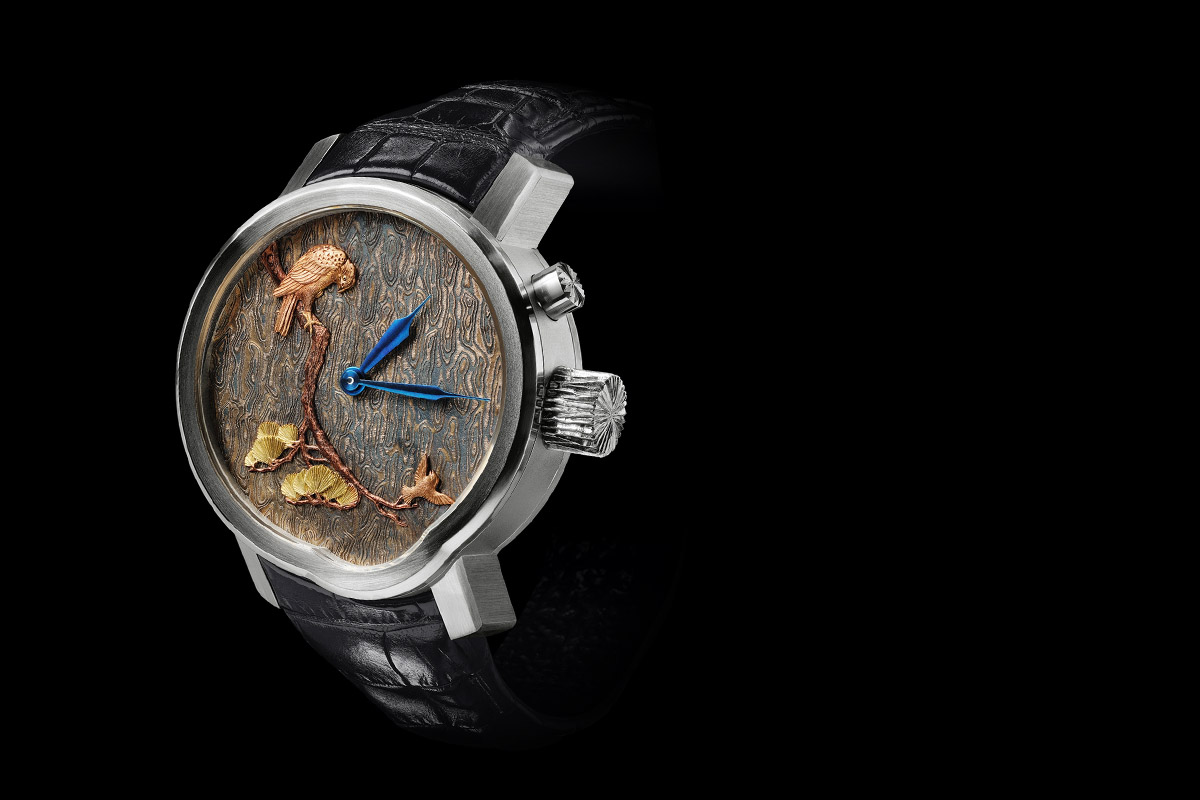Kees Engelbarts Platinum Tsuba Watch – Piece Unique

When you want a unique watch, a truly unique watch, and I’m not talking about a highly limited edition of a few dozen or even a few hundred pieces, there’s actually not that much choice. Certainly, if you can spare a few millions, you can ask one of the oldest watch companies – Vacheron Constantin – to create the most complicated watch in the world. However you can also choose to go another route, namely the route of hand-engraved and open-worked watches. And than you’ll find that one person in particular is a master of that game, and known around the world, among a small group of esteemed collectors, for his Mokume Gane, stunning dragons and highly open-worked movements. I’m talking about Geneva-based master-engraver Kees Engelbarts and today we’re going to have a closer look at his latest unique piece, the Platinum Tsuba Watch.
Kees Engelbarts started his career as an engraver, however because of his personal interest in Japan and Japanese art, he learnt how to apply the art of Mokume Gane in the small dimensions of a wrist watch. Mokume Gane literally means “wood grain metal” and Kees Engelbarts applies it on dials, hands, and even movement’s plates and bridges! Now-a-days he works both for a select number of high-end Swiss brands and private collectors. His work is highly regarded for the impressive and highly skilled work, and for depicting important art pieces. On one of his previous watches he engraved a dragon on the dial, but not just a dragon; it was a dragon that is on the ceiling of a temple in Kyoto. Today we’re looking at a piece with a hawk and a sparrow, and again, there’s a story to it…
 The dial of Kees Engelbarts’ latest watch depicts a scene, inspired by a ‘Tsuba’ with a hawk and sparrow. What’s a ‘tsuba’ you might wonder, and why this scene with a hawk and sparrow? First of all, a ‘tsuba’ is something from Japan, and probably only known to people familiar with in Japanese art and/or Japanese swords. A tsuba is a round or square-ish guard at the end of the grip of bladed Japanese swords that protect the hand of the swordsman. These tsuba eventually became elaborate pieces of art; far beyond their practical use. Here the inspiration came from a tsuba that was created by Hamano Masanobu, around the year 1836, which depicts a hawk and sparrow (see mage above).
The dial of Kees Engelbarts’ latest watch depicts a scene, inspired by a ‘Tsuba’ with a hawk and sparrow. What’s a ‘tsuba’ you might wonder, and why this scene with a hawk and sparrow? First of all, a ‘tsuba’ is something from Japan, and probably only known to people familiar with in Japanese art and/or Japanese swords. A tsuba is a round or square-ish guard at the end of the grip of bladed Japanese swords that protect the hand of the swordsman. These tsuba eventually became elaborate pieces of art; far beyond their practical use. Here the inspiration came from a tsuba that was created by Hamano Masanobu, around the year 1836, which depicts a hawk and sparrow (see mage above).
Kees Engelbarts used a variety of different materials for the dial. For instance, the hawk is made of red gold, the leafs are in green gold and the little sparrow is made of bronze. For the branch Kees Engelbarts used the art of Mokume Gane on pink gold/shakudo. The smallest details are also in various materials, like the eye of the hawk that is in yellow gold with a silver center. The eye of the sparrow is also in yellow gold. The hawk’s feet are in yellow-gold and the claws made of silver. The base plate, on which the scene is mounted, is white-gold/silver mokume gane and has been treated with nitric acid. This acid will attack the silver and leave the white- gold unharmed and this accentuates the vertical shape structure and creates a relief. Finally, the hands are in heat-blued steel.
All elements have been cut out by hand, adjusted and then soldered together. Once assembled the elements are engraved by hand in the low-relief technique. This gives a great 3D-effect when watching the scene from different angles. Some elements have been heated and/or treated chemically in order to change the colors giving the whole scene an antique look.
The watch has a 950-platinum case with a matte finish that measures a hefty 49 mm x 16mm! It is a big watch, that’s for sure, however from experience I can say that it this case (Kees uses it more often) really hugs the wrist and therefore it wear remarkably comfortable. Both in front and in the case back are sapphire crystals that have been treated with anti-reflective coating. The crown is at the usual 3 o’clock position and the pusher at 2 o’clock has to be pushed, in order to set the time. The protrusion at 5 o’clock position is to accommodate the large main-spring barrel.

Under that beautiful dial is a NOS (new old stock) AS 690 calibre with eight days of power reserve. The movement has also been decorated with mokume gane of white-gold and silver in a star-like shape. The screws are hand-polished, beveled and heat-blued.
To give you an idea of how much time it takes to create such a master piece, you should know that Kees Engelbarts makes only a few pieces per year. This watch for instance took him several months of painstaking labour, all done with his own, very skilled, hands. Every step of the creation proces is delicate and extremely time-consuming. For Kees Engelbarts, “hand-made” is not just a marketing slogan!
To learn more about Kees Engelbarts’ watches and how to contact him, please visit his website.






